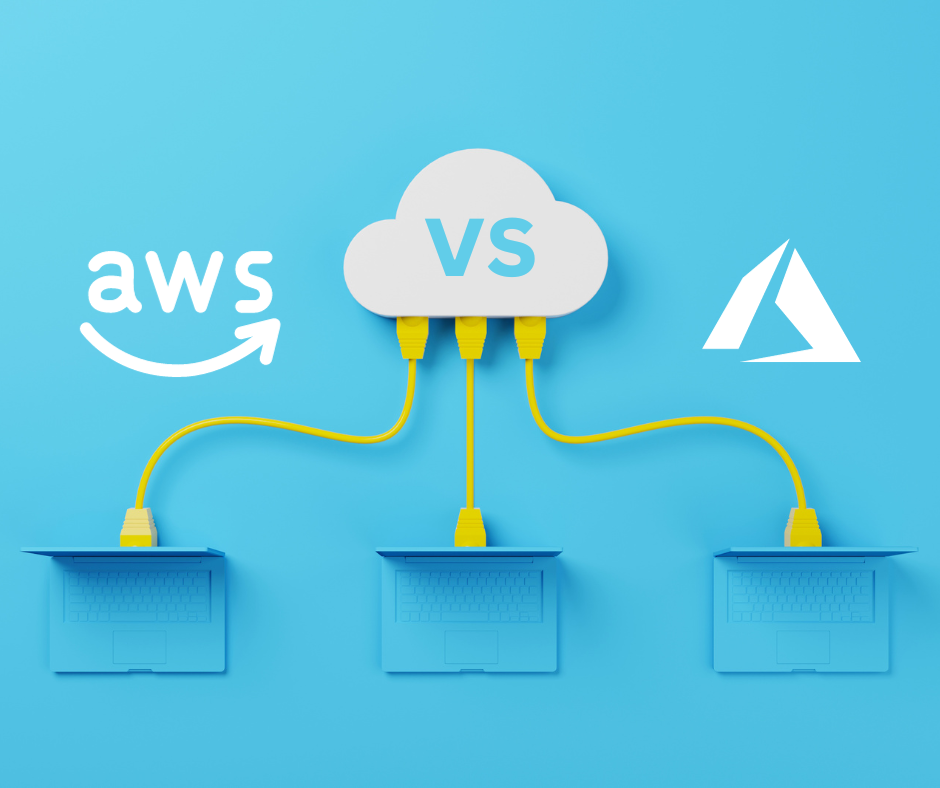Introduction
In this digital age, cloud computing has become a pivotal part of business operations. Two heavyweights in the cloud industry, Amazon Web Services (AWS) and Microsoft Azure, vie for supremacy. This blog post delves into the AWS vs Azure showdown to help you make an informed decision. Whether you’re a tech enthusiast, an IT professional, or a business owner, choosing the right cloud platform can make or break your endeavours.
AWS vs Azure: The Showdown
AWS: The Reigning Champion
Unleash the Power of AWS
Amazon Web Services (AWS) has held the cloud computing crown for quite some time. Its comprehensive service offerings, global data centres, and extensive network make it a top choice. To implement AWS for your business, follow these steps:
- Sign Up: Visit the AWS website and create an account.
- Choose a Data Centre Region: Select the data centre region that suits your needs.
- Select Services: Pick the AWS services you require, such as EC2 for virtual machines or S3 for storage.
- Set Up Security: Implement AWS Identity and Access Management (IAM) to secure your resources.
Azure: Microsoft’s Challenger
Empower Your Business with Azure
Microsoft’s Azure, a formidable contender, offers a robust suite of tools and services. Here’s how to dive into the Azure world:
- Sign Up: Visit the Azure portal and create an account.
- Select Your Region: Choose a region from Azure’s global network.
- Service Selection: Pick from various Azure services like VMs, SQL databases, and more.
- Security Matters: Secure your Resources
AWS vs Azure – The Price Tag
AWS Pricing
Budget-Friendly AWS Options
AWS offers various pricing models to suit your budget:
- Pay-as-You-Go: Pay only for the resources you use, making it cost-efficient for startups.
- Reserved Instances: Commit to a one- or three-year term for significant cost savings.
- Spot Instances: Use spare AWS capacity at lower prices for non-critical workloads.
Azure Pricing
Flexible Options with Azure
Azure’s pricing models are equally flexible:
- Pay-As-You-Go: Pay for what you use, perfect for startups and small businesses.
- Reserved VM Instances: Reserve VMs in advance for reduced costs.
- Spot VMs: Access low-cost VMs for workloads that can handle interruptions.
AWS vs Azure – Performance and Scalability
AWS Performance
Unleash Speed and Power with AWS
AWS’s vast network ensures high performance:
- Scalability: Easily scale resources up or down as needed.
- Global Reach: AWS’s global presence guarantees low latency and high performance.
- High Availability: AWS offers redundancy and disaster recovery options for seamless performance.
Azure Performance
Scale Up with Azure
Azure boasts impressive performance features:
- Scalability: Quickly adjust resources to accommodate your growing needs.
- Global Network: Azure’s global footprint ensures low-latency connections.
- Load Balancing: Azure’s load balancers distribute traffic for optimal performance.
AWS vs Azure – Security Features
AWS Security
Fortify Your Business with AWS
AWS offers a range of security features, including:
- IAM: Control user access and permissions with AWS Identity and Access Management.
- Distributed Denial of Service (DDoS) Protection: Safeguard your applications from attacks.
- Security Groups and NACLs: Secure your virtual private cloud (VPC) with network-level controls.
Azure Security
Secure Your Business with Azure
Azure provides robust security tools.
- Azure Active Directory (AAD): Manage user identities and secure resource access.
- Azure DDoS Protection: Shield your applications from potential threats.
- Network Security Groups: Control inbound and outbound traffic to your virtual machines.
Conclusion
Choosing the right cloud platform, whether AWS or Azure, is a critical decision for your business. While AWS brings its extensive global network and comprehensive services, Azure offers a strong challenger with its Microsoft backing. Consider your unique needs, budget, and scalability requirements to make the right choice. Your business’s future success may depend on it.

